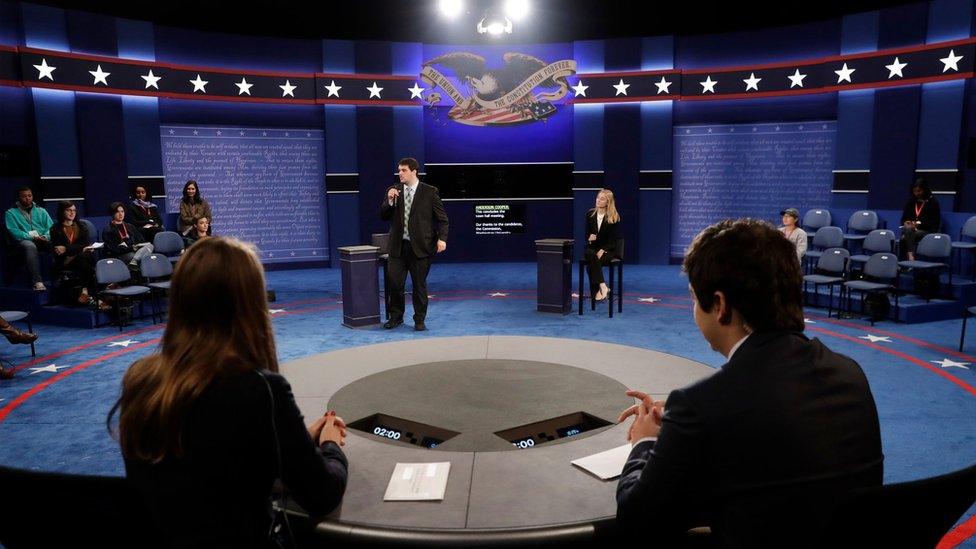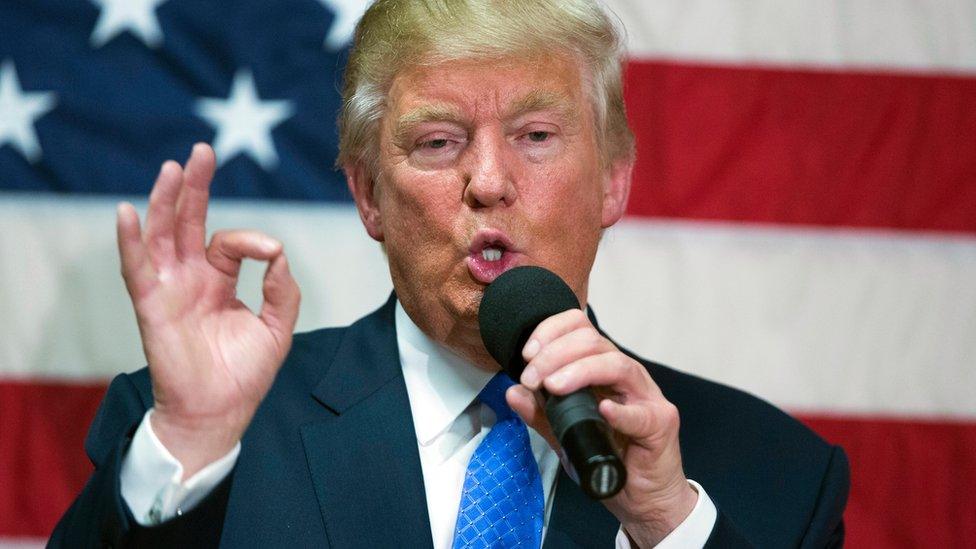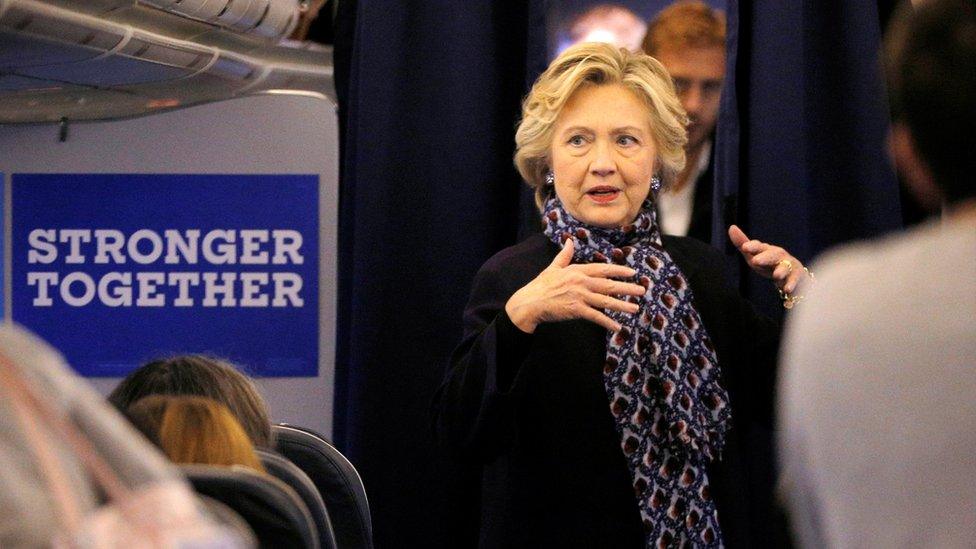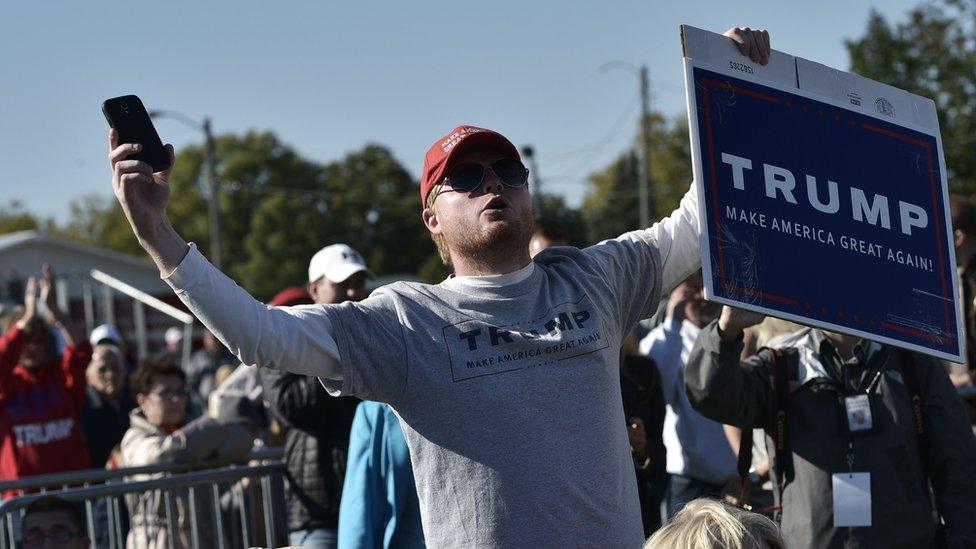US election: Terrifying questions for Trump and Clinton
- Published

The debate's town-hall format requires candidates not to dodge questions
Expectations are low but the pressure is high for Donald Trump as he prepares for the second presidential debate on Sunday night.
At this point, the performance bar from the Republican candidate is so subterranean you'd have to notify local utility companies before digging for it. Given Mr Trump's poor performance in the first debate and his inability to maintain any semblance of message discipline in the weeks since, mere coherence on stage may be enough to earn positive reviews.
When it comes to what he needs to accomplish, however, surpassing expectations won't be enough. Trump will have to be a political pole-vaulter to clear the bar required to get back in this race. He's trailing in the polls, the 2005 "hot mic" tape in which he boasts of sexually harassing women has caused an exodus of support among Republican officeholders, and many Americans are already casting ballots in key swing states. Time is running out, and he needs a triumphant performance to shake things up.
Meanwhile, Hillary Clinton faces challenges of her own. Mr Trump is down, and she has to make sure he stays there. Can she finish him off without overreaching? Will she make a positive case to voters who may dislike the Republican but may be considering third-party alternates?

Donald Trump will need all his debating skills put to good use on Sunday night
Complicating all of this is the debate's town-hall format, which rewards empathy and punishes politicians who go negative or dodge questions.
These types of events can be unpredictable, given that the priorities and concerns of the average-voter participants are often different, and differently expressed, than those of traditional media-savvy moderators.
Here are four questions that will make Mrs Clinton and Mr Trump squirm, however, even if they should see them coming.

Mr Trump, how can any woman support you now?
The Republican nominee was already suffering from high negative ratings among female voters before his lewd comments in 2005 went public. Now, however, he faces a historic wipe-out in that key demographic.
Trump apologises for lewd comments and vows to be a "better man"
When he's forced to address the controversy - it will be the first question asked, according to media reports - he has two choices on how to handle it.
The first is contrition. He could unconditionally apologise, say he has erred but has been redeemed by his experiences on the campaign trail, then move on to discussing his populist economic message.
This is the tactic that the Republican leadership, focused on avoiding disastrous losses in down-ballot races, would like him to pursue. Many officeholders who haven't abandoned the nominee at this point have said they want to see a humble Mr Trump take the stage on Sunday night.
The other option is total war. Mr Trump offers a pro-forma apology, then goes scorched-earth on Mrs Clinton, trying to tie her as a willing accomplice to every allegation of her husband's sexual misconduct both confirmed and unfounded.
While some Trump supporters remain loyal, others are changing their vote
Given that Mr Trump recently re-tweeted stories about the rape accusations made by Juanita Broaddrick against Bill Clinton and has mentioned the former president by name in both his video and printed statements on Friday, this isn't an unlikely scenario.
Mr Trump often boasts that he's a counter-puncher who responds with overwhelming force if he's attacked. He's probably itching to unload, even if it may not be in his party's best interests.

Mrs Clinton, how can you criticise Donald Trump given your husband's sexual history?

Clinton will have some tough questions to answer, too
Mr Trump has been telegraphing a personal attack on Mrs Clinton and her husband practically since the end of the last debate, so she should be well prepared should the subject come up. If you don't think her campaign has already focus-group-tested responses that will resonate with female voters in swing states, you don't know how they roll.
Something along the lines of, "My husband cheated on me and I decided to keep our family together. That was my choice, just like you cheated on your wives and they decided to leave you" could be a political kill shot.
Knowing what to do and actually pulling it off in the heat of a debate, however, are two different things. A coin toss means Mrs Clinton will be asked about this before Mr Trump, so she may want to hold her heaviest fire until after he tips his hand. Or she could try to goad him into an angry, impolitic response.
Mrs Clinton is an intensely private politician, and a baring-of-the-soul moment where she acknowledges her husband's infidelity would be extraordinarily difficult for her. She may instead choose to express her disgust at Mr Trump's statements and move on. That could be the safe move, but it also may let Mr Trump off the hook and allow him to paint his transgressions and her husband's as equivalent.
If Mr Trump doesn't attack, Mrs Clinton has to decide how hard to press the issue. She must sense her opponent is vulnerable, but she can't be seen as politically opportunistic. She's been dealt a strong hand, but she can still overplay it.

Mr Trump, why have you broken your promise to release your tax returns?
Remember when Mr Trump's taxes were going to be the big issue that was litigated during this debate? The political bombshell of last week seems like a distant memory, but it still is likely to come up - and could cause the Republican nominee untold headaches.

Mr Trump believes his support base is strong
Mr Trump got irretrievably bogged down in his answer to the tax question in the first debate, and running-mate Mike Pence didn't do much better in the vice-presidential debate last week.
The challenge for Mr Trump is three-fold.
He needs to explain why he continues to refuse to release his tax returns. The under-audit excuse he has tried to roll out continues to be insufficient cover, given that he's said he's been under audit for more than a decade.
Second, he needs to tell the average voters in the debate hall why it is OK that they pay federal taxes every year but he seemingly managed to avoid them for as long as 18 years. Taking advantage of deductions is one thing, but such a long period of avoidance makes it appear he's playing by a different set of rules than most Americans.
And third, he needs to explain how he managed to lose nearly a billion dollars in 1995. Were they real losses or paper ones? How does that reflect on his proclamations of being a world-class businessman?
He could opt for saying that he knows how corrupt the tax system is, which makes him best positioned to fix it. That's how he's pitched his views on campaign finance reform in the past.
More effective, however, could be packaging his response in a redemptive narrative. He had his failures in the 1990s and rebuilt his empire, just as he will rebuild the nation. If he combines that with contrition for his past sexual transgressions, he may be able to frame himself as the sinner who has seen the light.
Of course, that would require up-till-now-unheard-of rhetorical deftness on Mr Trump's part.

Mrs Clinton, do you really want a hemisphere with free-trade and open-borders?
Buried beneath all the talk of Mr Trump's genital-grabbing was the story that key parts of Mrs Clinton's Wall Street speeches have apparently become public, thanks to (Russian?) hackers and Wikileaks.
The purloined missives, if they are indeed legitimate, paint a picture of Mrs Clinton as a globalist and Machiavellian moderate whose dreams of hemispheric unity would confirm the worst fears of blue-collar workers leaning toward Mr Trump and Bernie Sanders's populist supporters.
So far, the Clinton campaign has attempted to dismiss the revelations as part of Russian President Vladimir Putin's efforts to tilt the election to Mr Trump. Blanket denials may not be enough, however.
During the first debate, one of Mr Trump's few truly successful moments was confronting Mrs Clinton on her past praise for free trade deals. He pushed her to renounce her support for President Barack Obama's efforts to pass the Trans-Pacific Partnership, and she never came up with an adequate response.
It's all but impossible to make the case for the diffuse economic benefits of free trade in the current political climate. It's somewhat easier to defend immigration, given the importance of the Hispanic vote in swing states and the reluctance of many Americans to embrace Mr Trump's hard-line policy prescriptions.
Mrs Clinton will have to come up with an answer that doesn't appear shaped by political expediency. On immigration, that may be easy. On trade it will be very, very hard.

